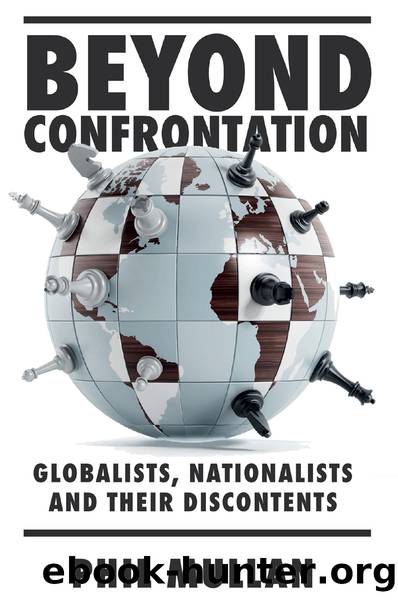Beyond Confrontation by Phil Mullan;

Author:Phil Mullan;
Language: eng
Format: epub
ISBN: 9781839825620
Publisher: Emerald Publishing
Published: 2020-06-10T00:00:00+00:00
Globalist Complacencies
Considering the epochal power contests that brought about the two world wars, stopping another such war is a tough challenge. Thus, it would be naive to believe that putting an end to tariff skirmishes and maintaining the current relatively low tariff levels will themselves preserve peace. Moreover, exaggerating the role of âtrade warâ to serve as a polemical weapon is unintentionally diverting focus from the deeper roots of political rivalries.
Identifying trade disputes as a significant driver of international conflict can act as a false comfort: âeasing tradeâ maintains âpeaceâ. The trade-war-to-real-war narrative not only muddies the past but also dodges the genuine challenges of the present. And when globalists are themselves the architects of todayâs pervasive non-tariff protectionism, it is disingenuous too.
Globalists use the conventional trade war story to warn that, as happened in the inter-war years, demagogues are inflaming protectionist thinking. They caution that this could again spiral uncontrollably with disastrous consequences. Their attacks on mercantilist rhetoric from the likes of Trump gain moral authority by associating todayâs populists with the fascist nationalists of earlier in the twentieth century. It also allows them to reject the tariff protectionism of the past while endorsing the predominantly non-tariff protectionism of the present.
Prioritising the de-escalation of trade wars bypasses more serious economic and political challenges that will continue to fester. This is a triple evasion: first, of geopolitical tensions; second, of the conflicts engendered by other measures, including non-tariff protectionism; and third, of domestic production problems. All three are overshadowed by the fascination with tariff trade wars.
Geopolitical factors are the crucial channels of global ferment. These ebb, flow and transform. This is why in different circumstances, the responses to very similar economic developments will vary. For example, the United States broadly welcomed the industrial and technological advances of Japan, South Korea and Taiwan in the 1960s, because this strengthened allies in Asia against the Soviet Union. Today, in contrast, an anxious and less confident United States is opposing the industrial and technological rise of China.
It is in the realm of politics, specifically geopolitics, not directly in economics or technology, and certainly not in trading relations, that we find the trigger for the unravelling of an existing international order (OâRourke, 2017, p. 1). Politics becomes particularly disruptive when the leading capitalist powers face both domestic and international challenges. This characterised the first half of the twentieth century, and it is happening again now.
Second, the spotlight on tariff trade wars takes attention away from rivalry pursued through other measures. It is true that occasionally politicians have used trade policy as a weapon in pursuing national interests against rivals. In these circumstances, trade policies both reflect and contribute to geopolitical divisions (OâRourke, 2017, p. 24). A classic instance of an aggressive trade policy was when the United States placed restrictions on oil supplies to Japan in the 1930s, an act which helped precipitate the Pearl Harbor attack.
However, even these exceptional uses of trade policy against rivals operate alongside other economic policies and in parallel with diplomacy, spy craft and overt militarism.
Download
This site does not store any files on its server. We only index and link to content provided by other sites. Please contact the content providers to delete copyright contents if any and email us, we'll remove relevant links or contents immediately.
The Brazilian Economy since the Great Financial Crisis of 20072008 by Philip Arestis Carolina Troncoso Baltar & Daniela Magalhães Prates(106149)
International Integration of the Brazilian Economy by Elias C. Grivoyannis(75904)
The Art of Coaching by Elena Aguilar(52217)
Flexible Working by Dale Gemma;(23213)
How to Stop Living Paycheck to Paycheck by Avery Breyer(19573)
The Acquirer's Multiple: How the Billionaire Contrarians of Deep Value Beat the Market by Tobias Carlisle(12117)
Thinking, Fast and Slow by Kahneman Daniel(11812)
The Radium Girls by Kate Moore(11641)
The Art of Thinking Clearly by Rolf Dobelli(9936)
Hit Refresh by Satya Nadella(8871)
The Compound Effect by Darren Hardy(8531)
Atomic Habits: Tiny Changes, Remarkable Results by James Clear(8055)
Tools of Titans by Timothy Ferriss(7833)
Turbulence by E. J. Noyes(7720)
Change Your Questions, Change Your Life by Marilee Adams(7390)
A Court of Wings and Ruin by Sarah J. Maas(7289)
Nudge - Improving Decisions about Health, Wealth, and Happiness by Thaler Sunstein(7262)
How to Be a Bawse: A Guide to Conquering Life by Lilly Singh(7167)
Win Bigly by Scott Adams(6839)
